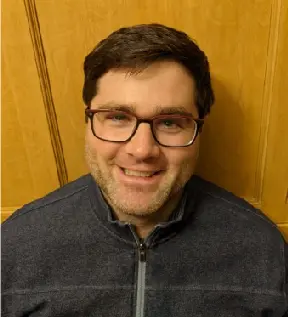Office of the Director of National Intelligence fellow researches ways to improve antibiotic safety
Meet William Bothfeld

William Bothfeld
William Bothfeld grew up on a one-hundred-acre hobby farm in Wisconsin. The natural world inspired him, so science became his favorite school subject. He wanted to know how everything worked and was in awe of how much scientists could accomplish with incomplete knowledge and the equipment they had on hand.
As an adult, he earned his bachelor’s of biochemistry, certificate of business and certificate of environmental studies from UW-Madison. Afterward, Bothfeld achieved his doctoral degree in chemical and biological engineering from Northwestern University. With these degrees under his belt, he was ready for the next step of his academic studies, so he applied for the Oak Ridge Institute for Science and Education’s (ORISE) Intelligence Community Postdoctoral Research Fellowship Program (IC-Postdoc), with the Office of the Director of National Intelligence (ODNI).
The IC Postdoc Program offers scientists and engineers from a wide variety of disciplines unique opportunities to conduct research relevant to the Intelligence Community.
Bothfeld was excited to develop himself through independent research, with guidance from his mentors Brian Pfleger, and Karen and William Monfre in the Department of Chemical and Biological Engineering and Dustin Harrison at the Defense Intelligence Agency. His scientific focus is on developing new classes of antibiotics to target pathogens without harming beneficial bacteria. He hopes this will limit or eliminate the negative effects of current antibiotics.
Antibiotics, while commonly used to treat illness caused by bacteria, must be tailored towards the kind of illness they seek to cure. This means that no antibiotic is a one-size-fits-all cure. An antibiotic that destroys harmful bacteria can destroy helpful bacteria in its wake. Bacteria can also become resistant to an antibiotic over time and spread resistance to other species, so that it is no longer effective. This makes drug development in this area incredibly risky. Furthermore, once resistance to one antibiotic develops, resistance to similar antibiotics means that entirely new antibiotics must be created. These are all factors that Bothfeld has had to consider over the course of his research.
“Our solution is to target genes in the harmful bacteria of interest, turn them on, and cause self-killing,” said Bothfeld. “This would enable truly species-specific antibiotics, as only the target species has the gene that is being turned on.”
This means that if the specific gene-target inside an individual bacteria species can be manually turned on, those individuals will simply die. Bothfeld is able to flip on this “kill switch” by using a DNA sequence called an antisense oligo (ASO). ASOs are much cheaper to order and test than current antibiotics, making them ideal for experimentation and potentially mass production in the far future. This could increase the speed in which scientists can combat bacterial infection.
“We hope to develop a pipeline of antibiotics that could be rapidly deployed by identifying a pathogen, determining its genome, then rapidly designing and testing specific ASO therapeutics against that pathogen.”
Bothfeld is learning a novel way to run these experiments in bulk instead of testing ASO therapeutics one-by-one on different genes. As he tries these new strategies, he hopes to discover better and quicker ways to find the best “kill switch” genes in bacteria. He presented this research at the American Institute of Chemical Engineers annual meeting in Phoenix, in the fall of 2022.
Though he has the help of his mentors, much of his research time is spent by consulting the scientific literature to help design DNA sequences, put them together in lab and then analyze the effect of different bacteria using automated machines. Bothfeld said that the IC Postdoc program is helping him to translate his ideas from a proposal into tangible results in the lab and that it has been a “great experience so far.”
After his fellowship ends, Bothfeld plans to become a research scientist in academia, or would like to work for a biotech startup. For now, he will continue his experiments with the ODNI and recommends the IC Postdoc program.
“It is a great way to allow deep research into a research topic fully your own, and the support is great for carrying out that research.”
The Intelligence Community Postdoctoral Research Fellowship Program is funded by the Office of the Director of National Intelligence (ODNI) and managed by the Oak Ridge Institute for Science and Education (ORISE) under an agreement between the IC and the U.S. Department of Energy (DOE). ORISE is managed for DOE by ORAU.

